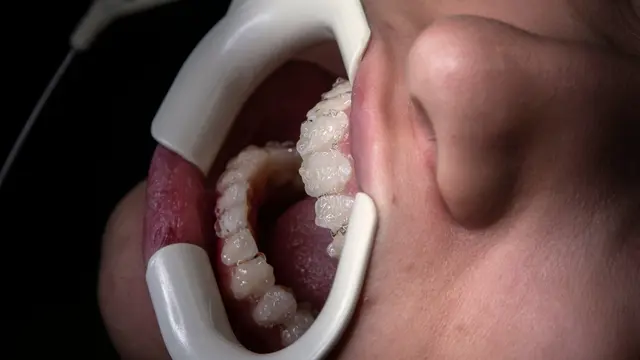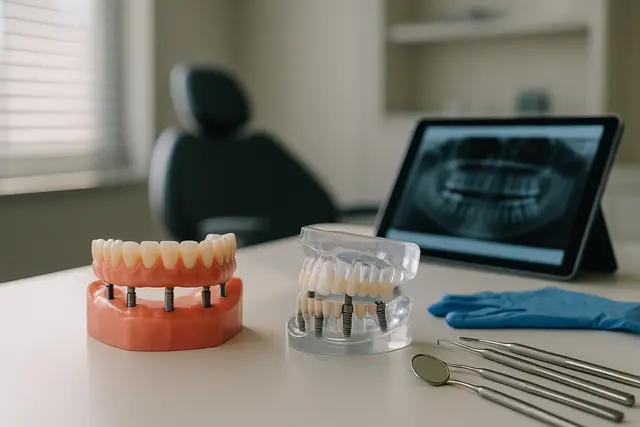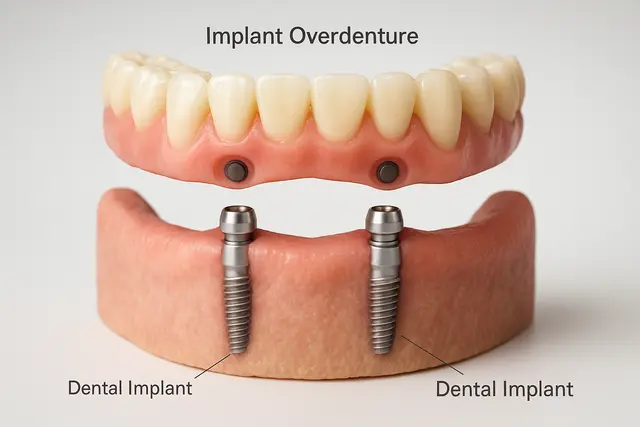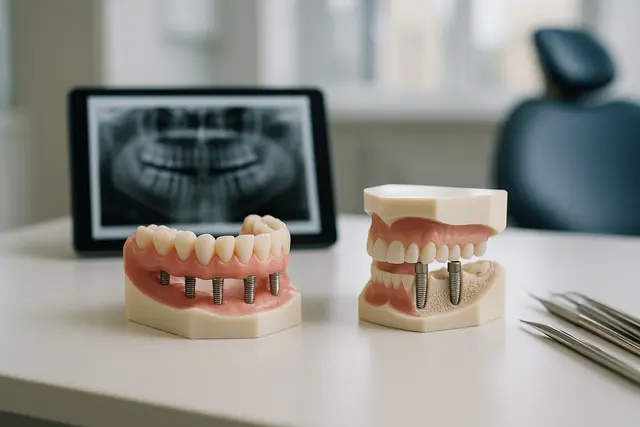Prosthodontics
6 min read
Mar 28, 2025
Are Dental Implants Painful? Sedation Options and Recovery
Dental implants are a reliable solution for replacing missing teeth. Many people worry about pain during and after the procedure. While discomfort is expected, modern techniques and sedation options make the process manageable. Understanding what to expect can help ease concerns.

If you’re considering getting dental implants, chances are one of your first questions is: “Will it hurt?” That’s completely fair. Nobody signs up for pain if they don’t have to, especially when the words dental implant surgery sound like something straight out of a sci-fi novel. The truth is, while dental implant surgery does involve a bit of minor oral surgery, modern sedation options, good pain management, and a skilled dentist make the experience way more manageable than people often imagine.
Let’s break it all down, without sugarcoating but also without the scare tactics. Just the facts, mixed with a little warmth and experience.
Dental Implant Surgery: What’s Really Going On?
First, let’s get something straight. Dental implant surgery sounds more dramatic than it feels. At its core, it’s a precise surgical procedure where a titanium post, aka an artificial tooth root, is inserted into your jawbone where your tooth used to be. This post will eventually support a new artificial tooth or dental crown.
The process starts with imaging and planning, then surgery day arrives. Your oral surgeon or dental professional numbs the area, and if needed, offers sedation options to keep you calm or even snoozing through it. For many patients, the phrase “I didn’t feel a thing” isn’t just a polite exaggeration, it’s their honest experience.
Dental Implants: Why People Are Choosing Them Anyway
Why go through this at all? Simple: dental implants offer a stable, long-lasting way to replace missing teeth. Compared to a denture or dental bridge, they feel more like natural teeth, look better, and don’t mess with your eating or speech. And if you’ve dealt with tooth loss, you already know how much that can mess with your confidence.
Plus, with proper care and maintenance, they can last decades. Not to mention, implants help preserve the jawbone, which tends to shrink after tooth extraction. So, the investment pays off not just in looks, but in long-term oral health too.
Pain Associated with Dental Implants: Let’s Talk Straight
Okay, but do dental implants hurt? Not during the surgery itself. Thanks to local anesthesia, you’ll likely feel numb, not pain. If you choose sedation, you may not even remember the procedure.
However, it’s normal for patients to experience some pain and discomfort once the numbness wears off. The level of pain? Think sore gums and jaw, like after a deep cleaning or tooth extraction, but a bit more intense for the first couple of days.
This is your body reacting to a surgical site, after all. Dental implant surgery involves trauma to the gum and jaw bone, but it’s typically mild and short-lived. Most pain during your dental implant healing phase is managed with over-the-counter pain relievers or, occasionally, prescribed meds for the first couple of days.
Anesthesia and Sedation: You’ve Got Options
No, you’re not stuck gritting your teeth. Anesthesia choices vary depending on the patient and the complexity of the dental implant procedure. Here’s what might be on the menu:
Local anesthesia: Numbs the implant site. You’re awake, but you won’t feel any pain.
Sedation: If the idea of staying awake makes you squirm, sedation (oral or IV) can help you relax or even snooze through the procedure.
General anesthesia: Rarely needed, but available for complex cases or extremely nervous patients.
Talk to your dentist about your comfort level. Whether it’s your first dental procedure or your tenth, your input matters.
Tooth Extraction and Bone Grafts: Do They Add Pain?
If you need a tooth extraction before getting your implant, or a bone graft to beef up a weak jawbone, yes, there’s a bit more involved. These are extra steps in the implant process, but again, they’re usually well-controlled with anesthesia and post-op care.
A bone graft might be needed if your jawbone during an oral surgery shows signs of being too thin or soft to hold an implant. It sounds intense, but many patients say the discomfort is mild and passes quickly.
So, How Much Pain Are We Really Talking About?
Let’s get practical. Most people say the pain associated with dental implants is surprisingly minimal. Sure, there may be swelling, bruising, or a sore jaw, but the phrase severe pain doesn’t usually apply. And if it does? That’s a red flag worth calling your dental office about.
Pain after the procedure typically peaks in the first 48 hours. An ice pack can help with swelling, and your dentist will likely recommend over-the-counter pain relievers. It’s rare to need prescription-level meds beyond day three unless there’s a complication.
What if you have low pain tolerance? Let your provider know. Many dental professionals tailor post-op care plans to match the patient’s comfort level.
Discomfort After Dental Implant Surgery: What’s Normal vs. What’s Not
Discomfort after dental implant surgery is expected. But here’s a quick cheat sheet:
Normal:
Tender gum around the implant site
Mild swelling in the cheeks or jaw
Some bleeding in the first few hours
Jaw stiffness for a few days
Occasional aching near the nerves surrounding the dental implant
Not normal:
Prolonged pain past a week
Pain that worsens rather than improves
Bad breath or pus around the area
Fever or chills
If anything on the second list pops up, contact your dentist or oral surgeon right away. These could be signs of implant failure or infection.
How Long Until It Stops Hurting?
Most patients feel back to normal within 5–7 days after surgery. The surgical site continues to heal for a few weeks, but the pain and discomfort usually fades fast. Once osseointegration, where your jawbone fuses with the titanium post, is underway, you won’t even notice it’s there.
In fact, once healing is complete, your new tooth will feel like a natural tooth. You’ll be chewing, smiling, and brushing like usual. No shifting, clicking, or reminding yourself not to sneeze too hard, unlike some other tooth replacement options.
Tips for a Smooth Recovery (Because You Deserve It)
Here’s how to boost your healing and comfort levels:
Stick to soft foods the first few days, soups, smoothies, yogurt are your friends.
Keep the area clean, but avoid brushing right around the implant in the early days.
Use an ice pack in short bursts to reduce swelling.
Avoid smoking or alcohol, they slow healing and increase the risk of dental implant failure.
Show up for your regular dental check-ups so your dental care team can make sure all is well.
When Dental Implants Feel Like the Best Decision Ever
Here’s the part nobody tells you: most people who were afraid of the pain during the procedure look back and say, “I should’ve done it sooner.” The idea of getting dental implants might stir up nerves at first, but it’s one of the most common dental treatments for a reason, it works. And it works with minimal discomfort.
Dental implants require patience, yes. They involve surgery, yes. But they give back what tooth loss takes away: confidence, comfort, and quality of life. You don’t have to live with a missing tooth without options.
So, if you’re considering dental implants, talk to your dentist, ask the tough questions, and weigh it out. With the right dental professional by your side, a little temporary soreness is a small trade for a strong, lasting smile.
Do Dental Implants Hurt During the Procedure?
Most patients feel little to no pain during the dental implant procedure thanks to local anesthesia and optional sedation. The area is fully numbed, and many people report being surprised by how comfortable the process is. If you opt for sedation, you might not even remember the procedure at all.
What Kind of Pain Should I Expect After Dental Implant Surgery?
After the numbness wears off, it's normal to feel some soreness, swelling, and mild discomfort, similar to having a tooth pulled or deep cleaning. This usually peaks within the first 48 hours and fades within a few days. Most people manage it easily with over-the-counter pain relievers and ice packs.
Can I Still Get Dental Implants If I Need a Tooth Extraction or Bone Graft?
Yes, you can still get implants if you need a tooth removed or a bone graft beforehand. These steps add a little more healing time and mild discomfort, but they’re common parts of the process. Your dentist will ensure you’re numb and comfortable throughout, and healing is usually straightforward with proper care.
How Do I Know If My Pain After Dental Implant Surgery Is Normal?
Some discomfort, swelling, and minor bleeding are normal for the first few days. But if your pain worsens after day three, persists for more than a week, or is paired with fever, pus, or a bad taste, call your dentist. Those could be signs of infection or implant complications and need attention right away.
Read Next
Related Posts

Prosthodontics
Implant Supported Dentures Overview
Missing teeth can impact more than just your smile, they can affect your confidence, comfort, and even your diet. Fortunately, modern dentistry offers a solution that’s both secure and natural-looking: implant-supported dentures. This innovative approach blends the stability of implants with the convenience of dentures to create a long-lasting, life-improving upgrade.
5 min read
Oct 29, 2025

Prosthodontics
Implant Overdentures Explained: The Hybrid Solution to Missing Teeth
Missing teeth can impact everything from your ability to eat to your self-confidence. While traditional dentures have long been a go-to solution, they often fall short in comfort and stability. Implant overdentures offer a modern alternative that combines the security of dental implants with the convenience of removable dentures, a true upgrade for those looking to reclaim their smile.
6 min read
Oct 29, 2025

Prosthodontics
Implant Retained Dentures Explained
Considering implant-retained dentures? You're not alone. As modern dentistry evolves, more people are turning to this secure, natural-feeling alternative to traditional dentures. This guide will walk you through what they are, how they work, and why they might be the solution you've been looking for.
4 min read
Oct 28, 2025
Don’t have time to research every dentist around you?
See why 30k+ patients trusted us